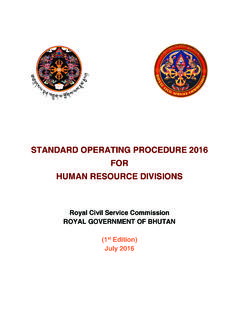Transcription of Climate Change Policy of the Kingdom of Bhutan 2020
1 Climate Change Policy of the Kingdom of Bhutan 2020 National Environment Commission royal government of Bhutan [FINAL DRAFT_ January 2020] 2 Contents 1. Rationale for a Climate Change Policy .. 1 Introduction .. 1 Vision: .. 1 Policy Goals: .. 1 Guiding Principles .. 2 2. Definitions .. 3 3. Policy Statement .. 5 Policy Objective 1: Pursue carbon neutral development .. 5 Policy Objective 2: Building resilience to Climate Change .. 6 Policy Objective 3: Ensure means of implementation .. 7 Policy Objective 4: Effective and coordinated actions .. 8 4. Legislative Compliance .. 90 Conformity and compliance with relevant legislation .. 90 5. Implementation procedure .. 112 General roles and responsibilities: .. 112 Institutional arrangements for Climate Change .. 123 Specific responsibilities .. 145 Processes for 145 6. Monitoring and Evaluation .. 18 Monitoring the implementation and effectiveness of the CC Policy and action plan.
2 18 Evaluation of progress in implementing the Review effectiveness of the Policy .. 18 7. Adoption Date .. 19 Annex I: Institutional Arrangement .. 21 Annex II: Climate Change Action Plan1 1. Rationale for a Climate Change Policy Introduction Bhutan is highly vulnerable to the adverse impacts of Climate Change . In addition to being a land locked and least developed country with a fragile mountainous environment, high dependence of the population on agriculture and the significant role of hydropower for economic development increase the vulnerability. Bhutan also faces increasing threats from Climate hazards and extreme events such as flash floods, glacial lake outburst floods, windstorms, forest fires and landslides. Bhutan has a development imperative and will pursue ecologically balanced sustainable development in line with development philosophy of Gross National Happiness.
3 To remain carbon neutral, growing emissions from economic development will need to be mitigated by pursuing low emission development pathways across all the sectors. In order to address challenges and opportunities arising from recent developments in national and international arena of Climate Change , the Climate Change Policy was developed. This Policy was formulated in a participatory and consultative manner throughout the process. Various stakeholders from governmental and non-governmental organization including Civil Society Organizations and private sectors were involved at the national and local level. Vision: A prosperous, resilient and carbon neutral Bhutan where the pursuit of gross national happiness for the present and future generations is secure under a changing Climate . Policy Goals: a. To provide strategic guidance to ensure that Bhutan remains carbon neutral and protects the wellbeing of the people of Bhutan by adapting to Climate Change in an efficient and effective manner; b.
4 To ensure meaningful participation of all relevant stakeholders in Climate Change action in a coordinated and coherent manner with clear roles and responsibilities; and c. To ensure that the challenges and opportunities of Climate Change are addressed at all appropriate levels, through adequate means of implementation (finance, technology, capacity building and awareness) and integration into relevant plans and policies. [FINAL DRAFT_ January 2020] 2 Guiding Principles The Climate Change Policy is guided by the following principles: The principle of state Policy to ensure a good quality of life for the people of Bhutan in a progressive and prosperous country that is committed to peace and amity in the world as articulated in Article of the Constitution of the Kingdom of Bhutan ; The principle of state Policy to Promote those conditions that will enable the pursuit of Gross National Happiness as articulated in Article of the Constitution of the Kingdom of Bhutan .
5 The fundamental rights and duties of each citizen to act as a trustee of the Kingdom s natural resources and environment for the benefit of present and future generations, including the prevention of pollution as articulated in Article 5 of the Constitution of the Kingdom of Bhutan The middle path approach in obligations of the royal government under Article 5 of the Constitution to conserve the environment for ecologically balanced sustainable development while promoting justifiable economic and sustainable development. The recognition of intergenerational equity and provision of a safe and healthy environment and for present and future generations of the people of Bhutan intergenerational equity, as articulated in and of the Constitution of Bhutan The precautionary principle as articulated in Chapter II of the National Environment Protection Act 2007 (NEPA 2007) and the no-regrets approach to taking beneficial action to safeguard against Climate Change .
6 The polluter pays principle and payment of ecosystem services to pay for use of resources and damages to the environment as elaborated in Chapter II of NEPA 2007 The right to information and the engagement of all stakeholders as articulated in NEPA 2007. Ensure coherent and clear implementation of national Climate priorities in line with international obligations. 3 2. Definitions Accessing Climate Finance: Refers to tapping finance from international Climate funds set up under the UNFCCC and other multilateral funds Adaptation: Refers to adjustment to cope with the adverse impacts of Climate Change Adaptation Communication: Refers to communication of the national efforts and requirements for enhancing and/or strengthening adaptation to Climate Change . Carbon sink: Refers to an ecosystem such as forest, soil and oceans that absorbs/sequester carbon dioxide and other Greenhouse Gases from the atmosphere Carbon neutral: Refers to a situation wherein the level of greenhouse gas emissions and sequestration by the carbon sink are leveled Climate Change : Refers to a Change in the weather patterns over a period of time Climate Change coordination committee (C4): A technical committee established through an executive order from the Hon ble Prime Minister and serve as a forum to discuss and coordinate matters related to Climate Change in Bhutan and make recommendations for consideration by the National Environment Commission Climate risk: Risk to life, health, infrastructure and any ecosystem arising due to Climate Change Convention (UNFCCC).
7 Refers to United Nation Framework Convention on Climate Change . The royal government of Bhutan ratified the convention in 1994. Conference of Parities (COP): Refers to the meeting of parties under the UNFCCC Cooperative approaches: voluntary scheme for carbon trading under the Paris Agreement Decoupling (of GHG emissions): Refers to reducing the growth in GHG emissions while making economic and social progress Greenhouse gas (GHG): Refers to the gases responsible for causing global warming Intergovernmental Panel on Climate Change (IPCC): a scientific and intergovernmental body under the auspices of the United Nations dedicated to the task of providing the world with an objective, scientific view of Climate Change and its political and economic impacts. Low emission development strategy (LEDS): Refers to a sectoral or national level development strategy aimed at ensuring socio-economic growth with minimum level of related GHG emissions Mitigation: Refers to reduction in the anthropogenic emission of GHG to reduce global warming National Adaptation Plan (NAP): Refers to a long-term plan for adapting to adverse impacts of Climate Change [FINAL DRAFT_ January 2020] 4 NAP process: Refers to the procedure and processes related to formulation of the NAP document and its implementation at a later stage National Climate Change Committee (NCCC): It is the highest body for decision making on matters related to Climate Change in Bhutan .
8 The National Environment Commission acts as the NCCC Nationally Determined Contribution (NDC): Refers to the best efforts put forth by countries under the Paris Agreement in order to ensure that the global temperature increase does not exceed 2oC above the pre-industrial levels. Paris Agreement: It is a global agreement under the auspices of the United Nations Framework Convention on Climate Change (UNFCCC) and agreed during the 21st Session of the Conference of Parties at Paris, France. It entered into force on 4th November 2016. Resilience: Refers to the capacity to recover from the damages caused by adverse impacts of Climate Change Resource Mobilization: Refers to negotiations and discussions with potential donor agencies or sources to secure resources for implementation of country plans and programs Stakeholder: Refers to all the agencies and bodies responsible/consulted for the formulation of the Policy including those that have a role in the implementation of this Policy Temperature goal (of Paris Agreement and 2 degrees): Refers to the objective of the Paris Agreement to restrict the global temperature rise below 2oC above the pre-industrial levels Transformative: Refers to causing a marked Change Vulnerability: Refers to susceptibility to a changing Climate Vulnerable groups.
9 Refers to the section of the society that are more prone to adverse impacts of Climate Change due to personal features of the individual (age, health etc) and/or social and institutional context such as levels of inequality and income etc.. 5 3. Policy Statement To achieve the overall vision and objectives of the CCP, four broad areas of actions are required covering mitigation of emission, adaptation to the adverse impact of Climate Change , ensuring adequate support measures and effective engagement among stakeholders. The royal government of Bhutan made the commitment to remain carbon neutral at COP15 of UN Framework Convention on Climate Change in 2009 and reiterated the commitment under its Nationally Determined Contribution (NDC) to the Paris Agreement in 2015 as a contribution to keep the planet safe for the benefit of present and future generations.
10 Climate Change poses a threat to sustainable development and to the pursuit of gross national happiness. Therefore, measures to build resilience and reduce vulnerability are necessary to adapt to the adverse impacts of Climate Change and minimize future Climate risks. In order to implement Climate actions, international support in the form of finance, technology, capacity building, research and awareness is required as outlined in the first NDC. Bhutan must be ready to access and receive international support while also mobilizing some amount of domestic support under the objective of achieving self -sufficiency and economic self -reliance. Climate Change is a cross-cutting issue and needs to be addressed comprehensively and coordinated effectively across all relevant sectors and levels.



